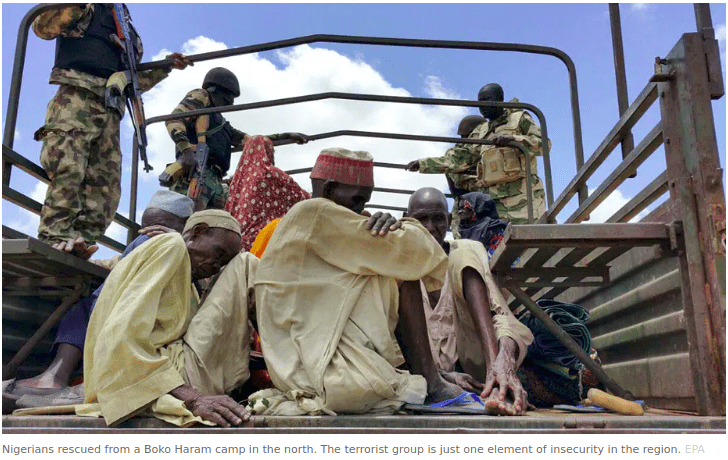National Issues
The Insecurity In Nigeria -By Osayanda Tracy Adesuwa
Nigeria is a diverse nation with different ethnic and religious groups, and unfortunately, tensions and conflicts between these groups have led to violence and insecurity. Crimes such as robbery, kidnapping, and cybercrime have been prevalent, posing a threat to individuals and contributing to a general sense of insecurity. Insufficient law enforcement is also a challenge.

In recent years, Nigeria has faced significant challenges regarding insecurity. The country has been grappling with various forms of violence, including terrorism, insurgency, banditry, kidnapping, and communal clashes. These issues have had a profound impact on the lives of Nigerians and the overall development of the nation.
One of the major factors contributing to insecurity in Nigeria is the presence of extremist groups, such as Boko Haram in the northeast. Boko Haram, which translates to “Western education is forbidden,” aims to establish an Islamic state in Nigeria.
Their attacks have resulted in the loss of thousands of lives and the displacement of millions of people. The country has witnessed the rise of banditry in the northwest and central regions. These criminal groups engage in activities such as cattle rustling, kidnapping for ransom, and armed robbery. The lack of effective law enforcement and the porous borders have allowed these groups to thrive and perpetuate violence.
Ethnic and religious tensions also contribute to insecurity in Nigeria. The country is home to diverse ethnic groups and religions, and conflicts often arise due to competition for resources, political power, or religious differences. These conflicts can escalate into violence, leading to loss of lives and displacement of communities.
Furthermore, the proliferation of small arms and light weapons exacerbates the security situation in Nigeria. These weapons are readily available and easily accessible, fueling criminal activities and escalating conflicts. The government’s efforts to curb the illegal arms trade and enforce strict gun control measures are crucial in addressing this issue. Insecurity remains a significant challenge in Nigeria.
The presence of extremist groups, banditry, ethnic and religious tensions, and the proliferation of small arms all contribute to the complex security landscape. Addressing these issues requires a multi-faceted approach, including effective law enforcement, intelligence gathering, community engagement, and socio-economic development. By tackling insecurity head-on, Nigeria can strive towards a safer and more prosperous future for its citizens.
Apart from the challenges posed by extremist groups like Boko Haram, there are other factors contributing to insecurity. One of them is the high rate of unemployment, especially among the youth. When young people are unable to find meaningful employment opportunities, it can lead to frustration and desperation, making them vulnerable to recruitment by criminal elements.
Another significant factor is the lack of adequate infrastructure and social amenities in many parts of the country. Poor road networks, limited access to healthcare facilities, and inadequate educational resources can create a breeding ground for criminal activities. Addressing these infrastructure gaps is crucial for improving security and fostering development.
Corruption and weak governance also play a role in exacerbating insecurity. When public resources are mismanaged or embezzled, it hampers the government’s ability to provide essential services and maintain law and order. Strengthening institutions, promoting transparency, and holding corrupt individuals accountable are essential steps towards tackling insecurity.
Intercommunal conflicts and clashes over land and resources contribute to the overall insecurity in Nigeria. These conflicts often arise due to historical grievances, competition for scarce resources, and political manipulation. Promoting dialogue, reconciliation, and equitable distribution of resources are key to resolving these conflicts.
It’s important to note that addressing insecurity requires a holistic approach involving various stakeholders, including the government, security agencies, civil society organizations, and the international community. Collaboration, intelligence sharing, and capacity building are crucial for effective security operations and the protection of lives and property.
While the challenges of insecurity in Nigeria are significant, it’s essential to remain hopeful and work towards sustainable solutions. By investing in education, job creation, infrastructure development, and good governance, Nigeria can create an environment that fosters peace, stability, and prosperity for all its citizens.
Nigeria is a diverse nation with different ethnic and religious groups, and unfortunately, tensions and conflicts between these groups have led to violence and insecurity. Crimes such as robbery, kidnapping, and cybercrime have been prevalent, posing a threat to individuals and contributing to a general sense of insecurity. Insufficient law enforcement is also a challenge.
Limited resources, inadequate training, and corruption within the law enforcement agencies have hindered their effectiveness in maintaining security and combating criminal activities. Economic inequality is another aspect that contributes to insecurity. The disparity in wealth distribution and lack of economic opportunities have created a fertile ground for criminal activities.
When people struggle to meet their basic needs, they may resort to illegal means to survive, further exacerbating insecurity Additionally, the weak judicial system, characterized by delays, lack of accountability, and corruption, undermines the rule of law. This can lead to a lack of confidence in the legal system and further contribute to insecurity.
Addressing these issues requires a comprehensive approach that includes improving governance, promoting economic development, enhancing law enforcement capabilities, and fostering social cohesion among different groups. By tackling these factors, Nigeria can work towards creating a more secure and stable environment.










